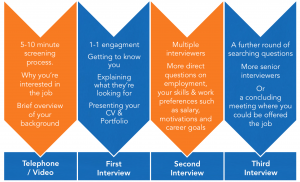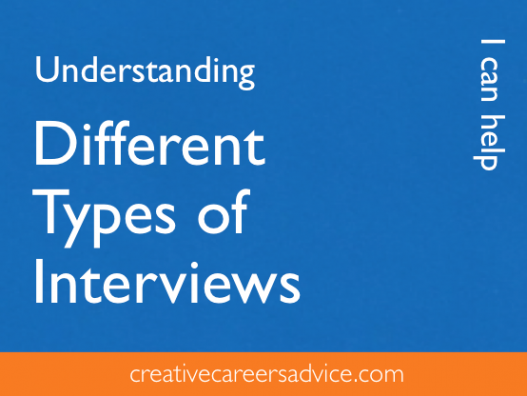There's a greater need for employers to recruit more creatively nowadays in order to attract a more demanding and discerning generation of candidates. This means when preparing for interview make sure you're familiar with the many different types of interview formats that you'll come across. It will will help reduce anxiety of the unknown; something we all can suffer when under the interview spotlight.
Gradually recruiters, Human Resources (HR) and companies in general are realising creating undue stress is not conducive to finding the right candidate... and much more effort is made to construct interviews that help put candidates at ease and not deliberately create stressful experiences.
This blog will help in your research and preparation for whichever type of interview format may be used and assist in increasing your chances of more successful interview outcomes.

The first types of interviews we might think about when applying for jobs are probably the most common: one-to-ones or panel interviews have been the most common for many years; However as the formats below demonstrates, there are many more being created in order to find the ideal candidates.
As applicant expectations rise and attitudes to how we work and behave in the workplace evolve and change, methods of recruitment are adapting to accommodate these attitudes. As you read through - think of the interviews you've experienced and the one's you might face for the first time and need to prepare for.
Interview Formats
1. Telephone Interviews This might be a call by a recruiter or hiring manager, to go over the vacancy, seeing if you're initially a good fit for the job, before being selected for the main interview. Be prepared by having all the tools you need at hand, laptop, notepaper, a bottle of water (anticipating 'dry mouth' nerves) and find a quiet neutral space if at home.

2. Video Interviews Companies have different approaches to interviews and some may do initial, half or all their interviews online. Your location may vary - it could be from home, the office or a recruitment centre. As you would in a phone call, remember to prepare well and behave professionally; dress and present yourself as you would for an in-person interview. However informal or remote the medium is or relaxed the interviewer may appear, treat it as a formal interview.
3. Pre Recorded Interviews It's important to be aware that there is a growing trend of companies using recorded video interviews. This involves allowing employers to interview many more applicants, allowing flexibility in interview times and more time taken for hiring new employees. The introduction of Artificial Intelligence (AI) adds another layer that helps refine the process. Software scans a candidate’s facial expression, tone of voice and levels of enthusiasm, body language and use of words. Controversial as it may be, it's important more than ever to be aware of your visual behaviours and expressions - with careful attention focused on to how you come across in the most positive way as new technologies add more levels of scrutiny.
3. In-Person Interviews This might be an introductory meeting or the main interview. It normally takes place in the office environment with a small group: the hiring manager and a representative from Human Resources. A senior member of the team might also be present. So your task is to give equal attention to all participants. In person enables us to pick up on people's expressions far more easily. Therefore, your body language, appearance and actions will all be far more acutely observed. So be aware how you conduct yourself throughout the interview.
4. Panel Interviews Interviewers from several departments and areas of a particular business may join the panel. This could be all in the same interview or in break-out interviews, so there may be a series of interviews to prepare for.. where interviewers ask questions about their specific skills requirements. It's a testing arena demonstrating how well you will perform under pressure, navigate group settings and handle different interviewer personalities.
5. Group Interviews Where multiple candidates are interview together. There are various reasons for this: it might be simply to reduce the number of interviews or more likely - to see how well you perform within a group situation. Here you'll need to be able to create a good enough impression to stand out from the other candidates, as well as demonstrate collaborative, team-based skills. It's a balance.

6. Assessment Day Interviews This can involve a whole day of setting group & individual tasks, 1-1 interviews, talks by key staff members and guided tours of the workplace. This type of interview process is a much more immersive and comprehensive experience for employers and candidates. It's by far the most successful selection process, giving you a better opportunity to impress and showcase your work as well as interviewers more able to assess you in a more holistic way. However, your stamina and ability to perform effectively through a long process of assessment is more challenging and you need to prepare carefully for such an event.
7. Virtual Interviews A situation where candidates engage in virtual environment tests are becoming more common. Companies, (such as Jaguar LandRover: https://www.assessmentcentrehq.com/jaguar-land-rover-assessment-centre/) are creating interactive virtual skills tests that candidates are expected to take in on an assessment day - which adds a more in depth, dynamic and fun aspect to the interview experience. But you'll need to be comfortable with a virtual environment. Companies draw creating a video game experience, so if your a gamer, this may suit you very well. If not, maybe have a go, get playing!
8. Second/Third Round Interviews Successful candidates need to shift into a higher gear after winning through to the next stage(s), because now the questions and tests become more specific and direct and the competition more intense. Although making it to the 2nd round is a great achievement, it doesn't guarantee the job is yours... many organisations include 2nd or even 3rd rounds. There will be searching questions about your employment preferences such as salary, motivations and career goals. The format might change with different interviewers participating, such as a more senior individual.
Summary:
There is no single interview process or template that companies or agencies follow, so it can be both daunting and confusing when the day comes you get the call to interview!.
There may be differences in formats, from telephone, video or in person, assessment day or a combination of set ups. The number and mix of interviewers may vary depending on the size of the company and the type and order of questions and tests will differ according to the nature of the work and technologies etc.
Here's a possible combination:

The only certainty you have is that there may be multiple formats, so you need to research & prepare for each situation when the opportunity to be interviewed presents itself.
"There are no shortcuts to any place worth going." Beverly Sills, singer
Action: Now think about how you need to prepare for each of the following types of interview. What particular skills and behaviours will you need to employ in order to perform exceptionally well to stand out and be selected.
1. Video Interview - the remote experience
2. In Person Interview - the 1-1 experience
3. Assessment Day Interview - the group experience
All photographs in this blog are courtesy of: Unsplash – https://unsplash.com/
© Paul Butler is a Creative Careers Adviser, Design Director and HE Lecturer in employability and Creative Industry careers.
For one-to-one creative careers advice and coaching contact me at: paulb@creativecareersadvice.com
If you found this blog useful share it with your contacts and follow me for more posts on creative careers advice and employability topics.
